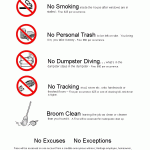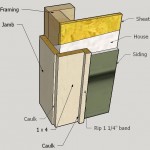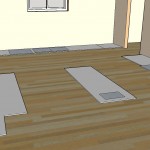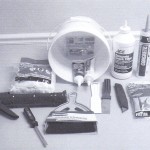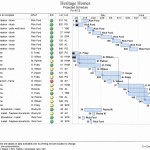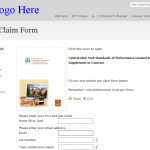Performance Standard: HBR articles 1-6, 1-7 Click icon to view book 
Crushed stone driveway settlement; warranty period: none, corrective measure: none
Cracked asphalt, concrete or paver driveway; warranty period: none, corrective measure: none
Asphalt Driveway
Notes
Binder Coat & Top Coat – an asphalt driveway has two coats; the binder, or base coat, and the top coat. If you were provided a binder only, you should install the top coat within one year. If you contracted a top coat through Heritage Homes, our vendor will, at no charge, correct any settlement prior to installing the top coat.
Homeowner Operation and Maintenance
Blacktop, or asphalt (sometimes referred to as “tarvia”), is a flexible and specialized surface. Like any other surface in your home, it requires protection from things that can damage it. Over time, the effects of weather and earth movement will cause minor settling and cracking of asphalt. These are normal reactions to the elements and do not constitute improperly installed asphalt or defective material.
Avoid using your driveway for one week after it is installed by keeping people, bicycles, lawn mowers, and other traffic off of it.
Chemical Spills – Asphalt is a petroleum product. Gasoline, oil, turpentine, and other solvents or petroleum products can dissolve or damage the surface. Wash such spills with soap and water immediately, and then rinse them thoroughly with plain water.
Hot Weather – Avoid any concentrated or prolonged loads on your asphalt, particularly in hot weather. Motorcycle or bicycle kickstands, trailers, or cars left in the same spot for long periods can create depressions or punctures in asphalt.
Nonresidential Traffic – Prohibit commercial or other extremely heavy vehicles such as moving vans or other large delivery trucks from pulling onto your driveway. We design and install asphalt drives for conventional residential vehicle use only: family cars, SUVs, light trucks, bicycles, and so on.
Seal Coating – Exposure to sunlight and other weather conditions will fade your driveway, allowing the surface gravel material to be more visible. This is a normal condition and not a material or structural problem. You do not need to treat the surface of your asphalt driveway. However, if you choose to treat it, wait a minimum of 12 months and use a dilute asphalt emulsion, rather than the more common coal tar sealant. Hairline cracks will usually be filled by the sealing process. Larger cracks can be filled or patched with a sand and sealer mixture prior to resealing.
BUILDER Limited Warranty
NONE
Homeowner Operation and Maintenance
Cleaning – Avoid washing exterior concrete slabs with cold water from an outside faucet when temperatures are high and the sun has been shining on the concrete. The abrupt change in temperature can damage the surface bond of the concrete. We recommend sweeping for keeping exterior concrete clean. If washing is necessary, do this when temperatures are moderate.
Do not use soap on unpainted concrete. Instead, use plain water and washing soda or if necessary, a scouring powder.
Cracks – Concrete driveway cracks do not necessarily need to be fixed or filled in.
Sealers – Although concrete is known for its strength and durability, it doesn’t last forever. Applying a coat of sealer will significantly increase its lifespan and keep it looking good.
Sealers protect against the elements, especially in our harsh climate where there are many freeze and thaw cycles throughout the year. When water penetrates the surface and freezes, it expands and breaks apart the concrete resulting in scaling and spalling. Sealers create a barrier that is impermeable to water and those harmful deicing salts.
Sealers also protect the surface from chemicals, especially acids, which may be spilled and makes cleanup easier.
A driveway should be resealed periodically, usually once a year. The best time is in the fall for maximum protection against the winter elements and the road salt brought back by your vehicles.
Stains – There are simple solutions for removing concrete stains. From leaky automobiles to rusty patio furniture, you can get rid of those eyesore stains on your driveway, porch, patio, etc.
If the stain is fresh and there is still unabsorbed oil on the surface, put down kitty litter or saw dust to soak it up. Clean that up after a few days.
Try household bleach first. Dilute it according to the instructions on the container. Pour it on the stain and let it sit for 10-15 minutes. Then scrub and rinse with water.
If that doesn’t work, sprinkle dishwashing detergent on the stain and scrub with hot water. Repeat this a few times.
BUILDER Limited Warranty
NONE
Notes
Even pavers that are not sealed resist damage from freeze-thaw and salts. Broken or stained pavers that resist cleaning can be easily replaced. Ants and weeds in joints can be prevented with sealers or herbicides.
Homeowner Operation and Maintenance
Benefits of sealing on your paver driveway
- Helps ease the removal of oil and grease, which can arise on driveways.
- Brightens up rich colors.
- Makes concrete pavers water resistant.
Note: Before applying any type of Sealer to your new or existing paved areas, it is recommended that you consult the advice of the paver manufacturer on the right type of sealer for your pavers.
Cleaning of pavers – Many products are available today to help with the cleaning of your paver driveway. Concrete pavers, clay pavers, natural stone pavers, granite pavers and marble pavers all need to be cleaned differently. For example some common cleaners may be to harsh for natural stone, others may contain too many acids and may strip concrete pavers of their color. So it is best to consult the makers of the product to have an understanding on what and where it can be used on. Follow manufacture’s cleaning procedures and instructions.
BUILDER Limited Warranty
NONE


